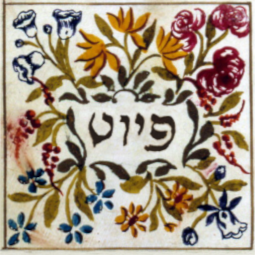Translation
Come, my beloved to meet the bride,
we’ll greet the Sabbath’s arrival.
Observe and remember in a single utterance
the singular Lord instructed us;
the Lord is One, and One is His name,
for glory, for praise and renown.
Come, my beloved, to meet the bride,
we’ll greet the Sabbath’s arrival.
Come, we’ll go toward the Sabbath now,
for she is the source of all blessing;
pouring forth from the fountain of time,
creation’s end, though first in conception.
Come, my beloved, to meet the bride,
we’ll greet the Sabbath’s arrival.
Royal city, shrine of our king,
arise and depart from your ruin;
you’ve dwelled in the valley of weeping too long:
but He will show you compassion.
Come, my beloved, to meet the bride,
we’ll greet the Sabbath’s arrival.
Shake yourself from the dust and arise,
put on, my people, the robes of your splendor,
through Jesse’s son, of Bethlehem:
“Draw near to my soul and redeem her.”
Come, my beloved, to meet the bride,
we’ll greet the Sabbath’s arrival.
Awake, arise, your light has come,
Rise up now, awake and shine:
awake, arise, and utter a song,
through you His glory is seen.
Come, my beloved, to meet the bride,
we’ll greet the Sabbath’s arrival.
You will not be abashed or shamed,
why, then, be abject and mourn?
Through you our afflicted will find protection,
and the city be built on its ruin.
Come, my beloved, to meet the bride,
we’ll greet the Sabbath’s arrival.
Those who sought your ruin will be ruined,
and they who’d destroy you be driven away,
in you the Lord will find delight,
as a bridegroom’s delights in his bride.
Come, my beloved, to meet the bride,
we’ll greet the Sabbath’s arrival.
Right and left, you’ll spread abroad—
in awe and worship, revering the Lord;
through the line of Peretz, Judah’s son,
we’ll exult in magnificent joy.
Come, my beloved, to meet the bride,
we’ll greet the Sabbath’s arrival.
Come in peace—O crown to her husband—
in joyfulness come, in gladness, and song;
among the faithful of this treasured people,
Come, my bride, my bride, come:
My bride, my Sabbath Queen.
Come, my beloved, to meet the bride,
we’ll greet the Sabbath’s arrival.
Translation by Peter Cole
From The Poetry of Kabbalah: Mystical Verse from the Jewish Tradition, translated, edited, and introduced by Peter Cole (Yale University Press, 2017), copyright © Peter Cole

 Sign in with Google
Sign in with Google
 Sign in with Facebook
Sign in with Facebook








